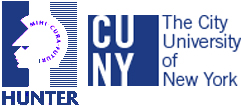 |
|
|||
| |
Valentina PagliaiAnthropology
Past Courses
This course examines language and its contribution to creativity, and how knowledge of language enriches human experience. It includes imagery and metaphor building through language; the effects of topic, speaking situation, and gender on creativity in tribal, state-level, and post-colonial contexts; and ways written language recasts and redefines human imagination.
Language plays a very
important role in our everyday life. Not only is linguistic behavior the
central focus of many social settings, but it is also on linguistic evidence
that we base many of our evaluations of the world around us. Yet attitudes
towards language and the ways in which we use language are highly dependent on
social and cultural factors. This course provides an introduction to the field
of linguistic anthropology: the study of language use in its socio-cultural
context from anthropological perspectives. It focuses on the social
significance of language by addressing such questions as: To what extent does
language shape our thoughts and identities? How does language influence the way
we think? Do all children follow the same language acquisition patterns within
a society or across cultures? How do languages develop and change? What are the
differences between language and dialect? What is the relationship between
language and ethnicity? Do women speak differently from men? How do we study
language use in its socio-cultural context? Why is Ebonics controversial?
Should we do anything about disappearing languages? Is English going to be the
world language? Etc.
Discursive practices have received increasing attention from scholars engaged in the study of language. This seminar will look at the relation between discourse and the construction of hegemonic power. The students will follow the invention of standard languages as part of the shaping of national identities, explore the role of linguistic ideologies in the colonialist enterprise, and examine the connection between language, racism and nation-making. The course will cover topics such as language planning, language revitalization movements, and literacy. We will address questions such as: how does language map onto social groups organized around notions of race, ethnicity, and peoplehood? How do languages operate as an index of allegiance, distance, solidarity, and power among social groups within the nation? How do various social actors use language to craft notions of collective “selves” and “others” within the nation?
Do women and men speak different languages? Are they really from different planets? Or is it just a question of differential power? Is patriarchal dominance reinforced and maintained through sexist language? And if so, can we change language to make it less sexist? Do “women” and “men” actually exist? And if they don’t, how do we construct them through the way we speak? It is possible to pull apart the effects of gender from those of class, race, ethnicity, age, sexuality, and other aspects of identity? These are some of the questions raised by the study of gender and language in the past few decades. By considering some of these debates, students will explore how both language and gender are grounded in structures of power, authority, and social inequality. We will examine the construction of sexual identities in conversation, including topics such as: language use in the gay/lesbian communities, the discursive construction of masculinity, etc. The course will have a discussion-oriented format and students will conduct their own research on the topics addressed in class.
This course looks at cultural and ethnic differences in communicative style, language use, and language socialization as these differences exist in the U.S. and abroad. The majority of course readings consist of short case studies written by linguistic anthropologists and sociolinguists who figure prominently in current communicative research. Because of this, students will learn first hand about recent trends in communicative research in such areas as: code-switching, language socialization, and interactional analysis. At the same time they acquire a thorough grounding in knowledge of the cultural diversity that exists in the U.S. The instructor's own ethnographic and linguistic research experience -- which includes work with the Italian American community in Los Angeles and the Tuscan Italian culture and language -- is also brought to bear at relevant points in the course. The case studies and concepts learned in this course, while fascinating in their own right, are also directly and pragmatically applied at several points in the course to important social, economic, and political problem areas in our society, including cross-cultural communication, and intercultural political arenas.
This course introduces students to anthropology through the reading a series of ethnographic monographs. While presenting the diversity in the ways that humanity has organized its social institutions and cultural systems, the course will focus on writing examining the approaches through which cultures can be understood. The students will conduct their own fieldwork during the course, and they will themselves engage in “writing culture.” At the same time, we will explore topics related to the study of cultural anthropology, such as the relations between economic systems and political systems; the meanings of family ties; and how individuals are both creatures of their culture and agents of their own lives. It explores patterns of global inequality -- by class, ethnicity, race, gender, sexuality and nation. As we read through the ethnographies, we will encounter examples from small-scale societies to the contemporary U.S. and covering most continents.
This course will examine cross-cultural images of manhood and womanhood as well as the debate in anthropology on the ways in which "genders" and "sexualities" should be understood and studied. The course will center on gender identities as performed and it will address several topics including: feminist perspectives in anthropology; the historical development of ideas of masculinity/femininity; gender and language; cross-cultural constructions of motherhood and caring; gender in colonial and post-colonial perspective; sexuality and desire; and gender and power.
How we speak is an essential part of our social identities. Through
language we portray ourselves to others and negotiate our relations. Social
categories are maintained or trespassed through our choice of linguistic acts. This
course will introduce the linguistic and social theories that are used to
examine the relationship between identities and the use of language. We will use anthropological and cross-cultural
perspectives to explore the relationships between language and social
identities, emphasizing in particular the ways in which gender and ethnic
categories are interwoven and embedded in structures of power and authority. We
will explore and discover these issues through reading ethnographic accounts
and conducting discourse analysis projects.
This course traces the historical evolution of theoretical attempts to define the relationship between language and thought, moving from the classic works by Sapir and Whorf and the successive debates on them, through the work of ethnolinguists and ethnoscientists, to contemporary approaches. We will explore the legacy of the Cognitive school in linguistic anthropology from its emergence until today, examining its basic propositions and looking forward to possible applications in future studies. Finally, we will discuss more recent work on metaphors and the conceptual structures that influence our behavior and thought.
Language, the uniquely human ability that defines our species, is central to this process. Until fairly recently the detailed study of how human beings use language to build their social worlds in face-to-face interaction was largely ignored. That situation has now been changed by exciting research that transcends traditional disciplinary boundaries in the human sciences. This course will introduce
This course features a multifaceted approach to the anthropological study of Art, by including contributions from linguistic and cultural anthropology, and archaeology, as well as the voices of the artists themselves. The course expands and rethinks definitions of art and language, encouraging a discussion of how such definitions can influence our ways to approach and experience art. Various art genres will be discussed in relationship to such issues as the construction of social identities (ethnic, racial and gender identities) and the structuring of political power.
This course focuses on a selected number of issues facing North Native American Indians. These include land rights, protection of the environment, creation of urban communities, challenges of economic development and education on the reservations, repatriation and reburial, exploitation of Native American images in the market economy, revitalization movements, and other topics. The course emphasizes native strategies of political and cultural survival amid incorporation into the world system. Through videos and presentations by invited speakers, the class will be particularly attentive to native voices and perspectives.
|
CUNY Hunter College
UCLA Department of Anthropology
|
© Copyright 2006 Valentina Pagliai. All Rights Reserved. Website Template by Interspire ![]() Last updated 8/28/2011
Last updated 8/28/2011



